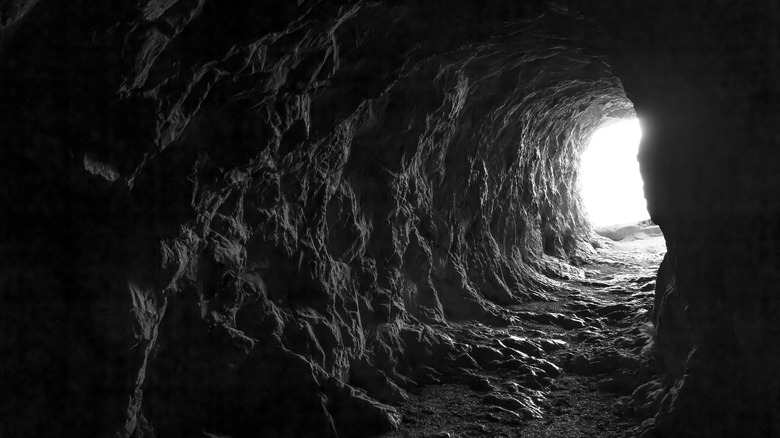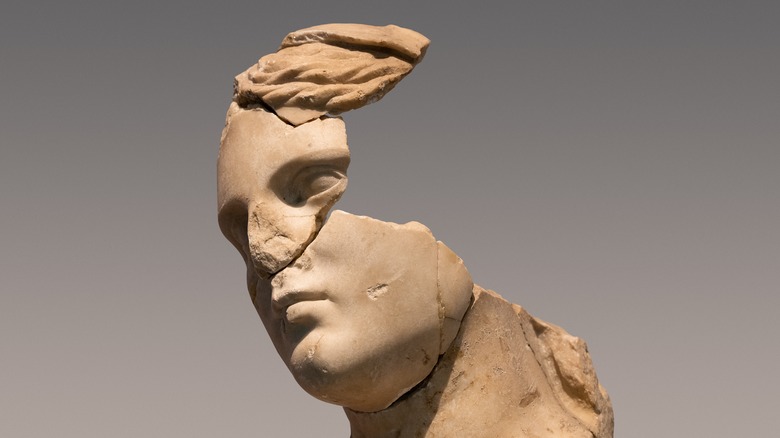The Odd Way Pre-Modern Philosophy Predicted Simulation Theory
Cogito ergo sum: "I think, therefore I am." When 17th-century French mathematician, natural scientist, and overall big thinker René Descartes came up with that little aphorism, he meant it skeptically, not as a motivational poster blurb. At the end of the day, he reckoned, what can we be sure is actually real and true? Not our knowledge, not our senses, not what we think, how we think, or anything else, per Stanford University's Encyclopedia of Philosophy. We can only be sure that if we think, we exist.
Descartes and other philosophers embody a fundamental assumption underlying Western philosophical thought: that what we see and experience is not what's finally "real." Our simian, biological brains and accompanying senses are riddled with biases and tendencies that garble clear perception and reason. But such statements also apply to larger, existential questions about the nature of reality. For instance, there's still minimal consensus about whether or not existence is a process of the mind or a set of objective events (via Big Think).
Some readers might immediately see the connection between this kind of thinking and what we know of as "simulation theory" — namely, that the entirety of our experienced reality is a fabricated nothing that exists nowhere outside of the mind. Maybe the developer of reality's operating system is "god." Maybe it's that logorrheic architect guy from "The Matrix: Reloaded." This is the connection we're going to survey in this article.
Plato's allegory of the cave
The Greek 4th-century B.C.E. philosopher Plato was one of the first to discuss the difference between true reality and perceived reality. Plato is hands down one of the most relevant and important thinkers in Western history — especially when it comes to his thoughts on wisdom, reason, and the dream of a just society ruled by a "philosopher-king" (via History). So if Plato, an apparently optimistic guy, says, "Our minds are trapped in the darkness of a cave out of which we can never see," it's a pretty big deal.
This is what Plato wrote in his "Allegory of the Cave" in "The Republic" (via Masterclass). The gist of the "Allegory of the Cave" follows a clear line of logic. We can't see ourselves in the cave because it's too dark. We also can't see the whole cave because we're in the dang thing. We can only see shadows we project on the wall, from what little light streams through the entrance. Light strikes the body — the barrier of our senses and mind — and projects onto the wall flat, limited forms we take for actual objects.
Plato's "Allegory of the Cave" relates to the difference between one's born self and the self created by enlightenment, awareness, and education. If we leave the cave and go back, we can never explain the outside to those who've never left. And if you're thinking, "Hey, that sounds a whole lot like Neo red-pilling reality in the 'Matrix,'" well, yes.
René Descarte's evil demon
René Descartes and his "nothing is real but me knowing I exist" statement inadvertently created a problem in philosophy and theology that we carry to the present: the mind-body separation, otherwise known as "Cartesian Dualism." If we believe in a soul or spirit, how does it interact with material things? Where inside your squishy, gray-mattered brain is your "soul" anyway? As NPR explored in a 2017 piece, this problem has only gotten worse over time. The reason? Because modern neurology seems to answer, "Nowhere; you're just a bunch of electrochemical signals that vanish on death."
But simulation theory depends on a separation of the mind and body. At least, it depends on the difference between "perceived reality" and "actual reality" that Plato described. And wackily enough, Descartes posited an "Evil Demon" thought experiment to talk about this very point. It sounds almost exactly like simulation theory. Descartes, however, did it to "prove" the existence of the Christian God. Imagine, he said, that reality is a fabricated illusion stuffed into your brain by an evil demon (via Stanford University's Encyclopedia of Philosophy). Would it be possible, in that case, to use the lies of a false reality to conceive of a true, perfect, all-good "God"? Descartes thought no.
Fast forward 350 years and we've got technological versions of such thought experiments, like Roko's Basilisk, posited in 2010. As Slate noted in 2014, Roko's Basilisk asks, "What if reality is the creation of an evil, nigh-omniscient AI damning us to eternal suffering in a simulation?"
Immanuel Kant's synthetic reasoning
Even though Plato and René Descartes described people struggling between the "perceived real" and "actual real," so to speak, they also portrayed people as helpless to intervene. The mind, they believed, is a plastic nothing shaped by sensory data, but not conscious will. Later, philosophers such as 18th-century Scot and ultimate skeptic David Hume expanded on this idea. Hume was a "phenomenologist" — i.e., reality is only what things happen — who believed it impossible to make absolute statements about anything (via Stanford University).
18th-century German philosopher Immanuel Kant disagreed. As philosophy's first proto-psychologist, he focused on the structures of the mind that create human reason. As Britannica summarizes, Kant believed that there was something to the mind — or of the mind — that integrates sensory information into some meaningful form. This aspect of the mind, the "synthetic a priori," occurs automatically before we have a chance to intervene. (In this case, "synthetic" doesn't mean "fake," but synthesized from experience.) We can examine this process consciously, and glean from it the difference between what's real and what we think is real.
While this sounds potentially empowering, it means that our ego, consciousness, or sense of being exists independent of sensory information; that "I" is somehow trapped in "me." If an evil demon, evil god, or evil AI could intercept Kant's "synthetic a priori" process, then it could dictate to us our supposed reality. Kant, then, accidentally paved the way for neurological grounds for simulation theory.
Edmund Husserl's transcendental ego
At this point, our Western philosophical tradition gets a bit muddied — especially as we enter what's called the "postmodern" period. The 20th century has seen philosophy, literary theory, political theory — practically everything, really — splinter off into as many schools and beliefs as there are people. In the end, all of them come back to the same "doubt everything you see, because reality is something beyond it" view. It also feeds modern simulation theory.
We can use mid-19th-century German philosopher Edmund Husserl as a good example. Like David Hume, Husserl disbelieved it was possible to know objective reality by using subjective, individual experience. Even so, he syncs up with Kant in believing that consciousness can be examined. In Husserl's version, per Philosophy Basics, consciousness can be "peeled back" to arrive at something approaching objective. You can observe yourself observing things, and so inhabit one's true "transcendental ego," or pure consciousness. Unfortunately, this still fundamentally means that we're stuck in Plato's dark cave with no way of seeing outside, outside ourselves, or ourselves inside.
At this point in the early 20th century, physics linked up with philosophy. It did this specifically with Albert Einstein's theories of general and special relativity and the quantum mechanics revolution according to the scientific journal "Foundations of Science" (via Springer). If even time and space are relative, and the properties of subatomic particles unpredictable, then maybe reality is just a big fat lie, after all. What to believe?
Nick Bostrum's simulated reality
At this point, it's clear that movies like "The Matrix" didn't pop up out of nowhere. Modernity has been primed for fear of (and belief in) simulation theory for thousands of years. It's basically just the newest version of a "free your mind" cautionary tale, but with a particular technological twist in our tech-saturated age. Even though Oxford University's Nick Bostrum, a Swedish philosopher, is often credited with popularizing the idea vis-à-vis his 2003 paper "Are You Living in a Computer Simulation," as well as the term "simulation theory," Bostrum's paper references existing sci-fi to make his argument.
Even if folks aren't aware of simulation theory as an actual, separate thing discussed in online articles and academic circles, many live a diminutive version of it every day. What else is a fake-life Instagram account? What else do movies like "Free Guy" depict, or books like "Ready Player One," TV shows like "Black Mirror," and services like Meta do, then? At this point, modernity not only hinges on simulation theory, but big companies also lean into it to make big money.
At present, we're left with the question of resignation that pre-modern philosophers never had to ask, as frequently discussed in-depth on the pages of outlets like The Conversation and Scientific American. That is, "If we accept that we live in a fake reality, if not a full-on AI-run computer simulation, can we still make meaningful choices?" Like all other answers, this one is up to the individual.





